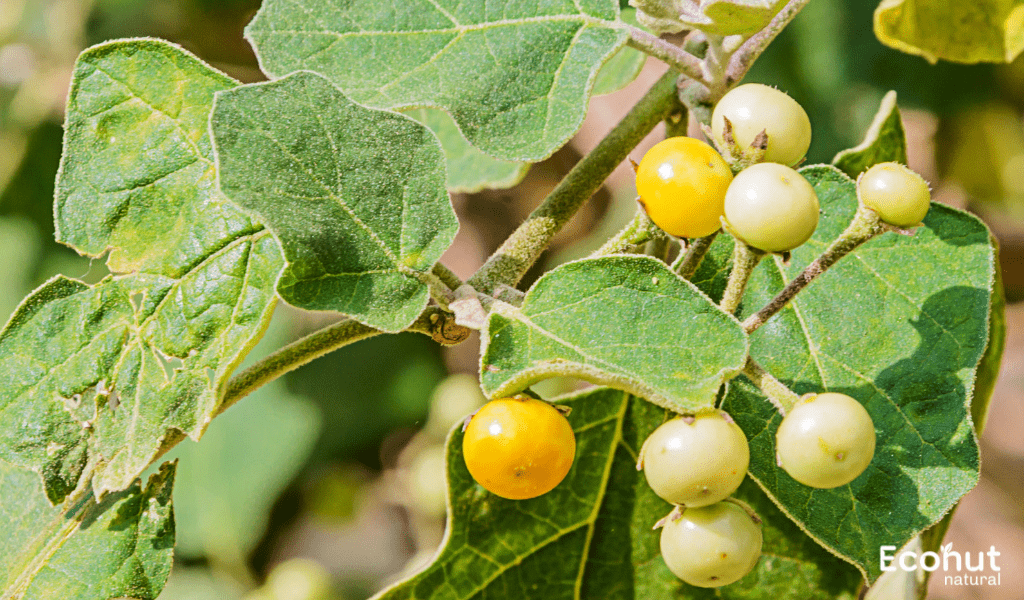Brihati (Solanum indicum) is a prickly shrub with many branches that can reach heights of 1 to 5 meters. Its branches normally disperse or diffuse. Tiny star-shaped hair is heavily covered on the younger branches of the plant. The spines are 1–5 cm long and have a bright yellow color.
One of the most popular and successful herbs in Ayurveda is Brihati, which is used to cure a variety of ailments like colds, coughs, and sore throats. It also makes a tasty appetizer because it is a natural digestive. It is useful to the heart and kidneys because of its diuretic properties.
Description
The fruit of this plant is also utilized in Ayurvedic medicine to treat respiratory conditions. The dry fruits of this plant are referred to as “Brihati.” Additionally, the fruit exhibits antipyretic, analgesic, anti-inflammatory, and other qualities.
Botanical Name:
Solanum indicum
Family:
Solanaceae
Leaves:
Ovate in shape, measuring around 5–15 cm × 2.5–7.5 cm, with sparse prickles on both sides. Simple hairs cover the upper surface of the leaves, while tiny stellate hairs cover the lower surface. Petioles are 1.3–2.5 cm long and have thorny tips.
Flowers:
Five-petalled white or pale violet flowers are borne in tiny clusters.
Fruits:
Berries known as gloobose, which are green when ripe and turn red or orange they have a diameter of roughly 1 cm and are filled with many tiny seeds.
Stems:
Robust, upright, branching, with a maximum height of 1.5 meters, and adorned with little brown stellate hairs and prickly thorns
Habitat:
Up to 1500 meters above sea level, brahmathi grows in tropical and subtropical regions of India and Nepal. This herb grows all over India, usually in open scrublands, roadside ditches, and waste areas.
Parts Used:
- Root
- Fruit
Dosage:
- Powder – 2-3gm three times a day.
- Decoction – 30 ml three times a day.
Chemical Constituents
Carotene, Carpesterol, Solamargine, Solasodine, Solanocarpone, Diosogenin, B- Sitosterol, Lanosterol, Solasonine, vitamin C etc solanidine.
Synonyms in the Sanskrit language
Bruhati – Brhat denotes a large size.
Kshudrabhantaki – also known as Bhantaki, derives its name from the fact that it resembles an egg plant in structure.
Simha – which translates to “lion,” is a plant that when used regularly makes the throat as strong as a lion’s.
Other– synonyms are Duspradharshini and Hinguli.
Other Language Names of Brihati, (Solanum indicum)
Guajarati name – Ubhi ringani
Urdu name – Kateli
Punjabi name – Kandiarivadd
Telugu name – Pedda Mulaka, Tella Mulaka
English name – Poison Berry, African Eggplant, Bush Tomato, Indian Nightshade,
Hindi name – Badi Kateri, Vanabhanta
Bengali name – Rambegun, Vyakud
Tamil name – Anachundai, Papparamalli,
Kannada name – Kirugullia, Heggulla, Gulla
Marathi name – Dorali
Assamese name – Tilabhakuri
Farsi name – Katai Kalaam
Scientific Classification
| Kingdom | Plantae |
| Family | Solanaceae |
| Genus | Solanum |
| Species | Indicum |
Ayurvedic Properties
Hindi/Sanskrit
- Rasa -Katu,Tikta
- Guna -Laghu,Rooksha
- Virya -Ushna
- Vipaka -Katu
English
- Taste -Pungent, Bitter
- Physical Property-Light, Dry
- Potency- Hot
- Metabolic Property (After Digestion)-Pungent
Brihati, (Solanum indicum) Uses
Cough:
Fry the fruit in butter after pounding it. Take this by mouth. As an alternative, cough relief can also be obtained by consuming root juice along with honey.
Fever:
Add 24 grams of each of the following: Brihati, Giloy, Nagarmoth, Amalaki (Indian gooseberry), and Shunthi (dry ginger). After pulverizing the blend, divide it into five equal portions. Take one part in a decoction once a day, with a little honey and long pepper.
Asthma:
A decoction prepared from Brihti, (Solanum indicum) root is beneficial.
Alopecia:
Fruit juice is applied externally and combined with honey.
Enhanced Erection:
Use of a paste prepared from the seeds.
Bronchitis with Fever:
Assemble the roots of the Brihati plant, one part raisins, Justica Adhatoda, Solanum xanthocarpum, and Sida cordifolia in a decoction. After filtering the infusion, drink it.
Don’t miss: Rasna (Alpinia Galanga) – Uses, Health Benefits, Properties & Side Effects
Brihati, (Solanum indicum) Benefits
Digestive Aid:
Brihati (Solanum indicum) is a great aid for a healthy digestive system since its bitter flavor encourages the secretion of digestive juices. It helps to improve digestion, increase metabolism, and improve nutrient absorption. Including brihati in your daily regimen can help keep your digestive system in harmony.
Urinary infections:
When used to treat dysuria, brihati functions as a diuretic, increasing the flow of urine. Additionally, this plant causes the body to excrete calcium oxalate, or calcium deposition, through the urine.
Skin Health:
Brihati, being high in antioxidants, has the ability to support skin that is clear and glowing. Fighting oxidative stress helps shield the skin from conditions like eczema and acne. Its anti-inflammatory qualities can also help to maintain a healthy complexion and relieve skin irritations.
Respiratory disorders:
It clears the respiratory channel and expels thick mucus from the lungs due to its expectorant effect. It also relieves various respiratory problems like colds, sore throats, coughs, etc.
Immune Booster:
The immunomodulatory properties of brihati support the body’s defenses. Brihati can strengthen immunity and increase the body’s resistance to diseases and infections when taken regularly. It enhances the immune system’s capacity to identify and neutralize possible dangers.
Brihati, (Solanum indicum) Side Effects
Digestive problems:
Brihati may cause issues with nutrient absorption and digestion.
Gastrointestinal issues:
Possible adverse effects include nausea, vomiting, diarrhea, and stomach pain, particularly at large dosages.
Pregnancy and breastfeeding:
Owing to its possible toxicity, brihati is not advised for women who are pregnant or nursing.
Interaction with medications:
Consult your doctor before using brihati since it may interfere with certain drugs.
Conclusion
Brihati, (Solanum indicum) acts as an absorbent and alleviates malabsorption syndrome, diarrhea, and IBS. In addition, it addresses heart conditions, fever, skin conditions, anorexia, etc. Although brihati has no known negative effects, pregnant women, nursing mothers, and small children should use it carefully and only after seeing a doctor.
FAQS
What is the herb Brihati used for?
One of the most popular and successful herbs in Ayurveda is brahmathi, which is used to cure a variety of ailments like colds, coughs, and sore throats. It also makes a tasty appetizer because it is a natural digestive. It is useful to the heart and kidneys because of its diuretic properties.
What is the botanical name of Brihati?
Solanum indicum
What adverse effects does Brihati have?
Although this plant has no negative effects, it should not be used by small children, pregnant women, or nursing mothers. Thus, utilize it only after speaking with the physician.
Does Brihati work for respiratory conditions?
Brihati’s expectorant properties make it useful in treating respiratory conditions such as colds, coughs, asthma, etc

